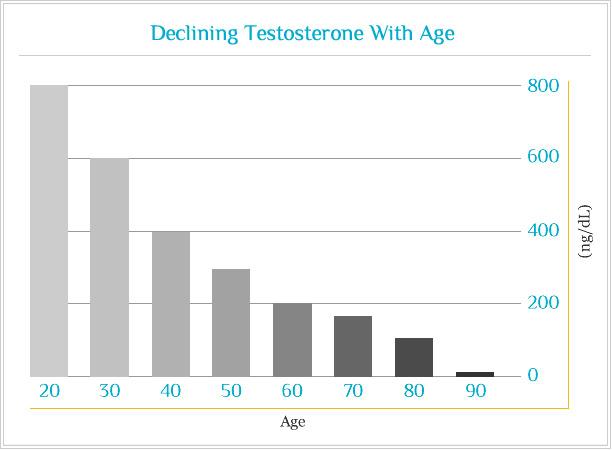Low Testosterone and Andropause
What causes low testosterone?
Testicular production of testosterone is under control of hormones made in the brain. Gonadotropin releasing hormone from the hypothalamus acts on the pituitary gland to make LH that activates cells
in the testes to make testosterone. Testosterone levels peak in the 20’s and then steadily decline
as a natural process of aging. While that sounds pretty complicated (and it is), lets examine an
analogy to this process.

Your home has a heating system with a thermostat, wires carrying a signal to a heater unit, and the heat that is released. Now let’s say that the thermostat is your brain, the signal is LH, the heater unit
is the testicles and the heat it makes is your testosterone.
On a cold winter day of 27 chilly degrees you set the thermostat to a perfect 68 degrees indoors.
A signal is sent to the heater to make heat, which raises the temperature inside to 68. Once that temperature is reached, the thermostat stops sending the signal and heating stops. When the temperature drops below 68, the signal is sent again and heat is made to reach that perfect temperature.
Now lets imagine a couple of problems that can occur with this system. In one circumstance, the thermostat is broken and no signal can be sent – result, no heat. In another, lets say the wire carrying the signal short-circuited and the signal cannot properly get to the heater – result, not enough heat. Finally, lets say a coil inside the heater broke and despite a good signal not enough or no heat can be made. In all of these cases, the result is that there is not enough heat and the temperature inside drops until it is the same as outside.
This analogy represents that variety and complexity of male hormonal imbalance.
One of the goals at Vitality Logix is to help clear up many of the misconceptions about low testosterone and the medical studies about its treatment, particularly hormone replacement therapy (HRT).
Through specialized training, Dr. Gizersky has gained expertise in this field and is on the cutting edge of its latest developments and medical breakthroughs to guide you through this complex condition and offer the safest, most appropriate and individualized treatment options.

Hypogonadism is the malfunction of the glands that are responsible for sex hormones (testosterone). There are two types of hypogonadism:
- Primary – a problem with the leydig cells in testicles
- Secondary – a problem with the network or feedback loop of hormones controlling testicular testosterone production
Some men readily convert, or aromatize, their testosterone to estrogen. This changes the normal ratio of these two hormones and can cause symptomatically low levels of testosterone. Also, environmental toxins such as heavy metals and BPA, commonly found in plastics, as well as products such as tea tree oil and lavender are associated with low levels of testosterone.